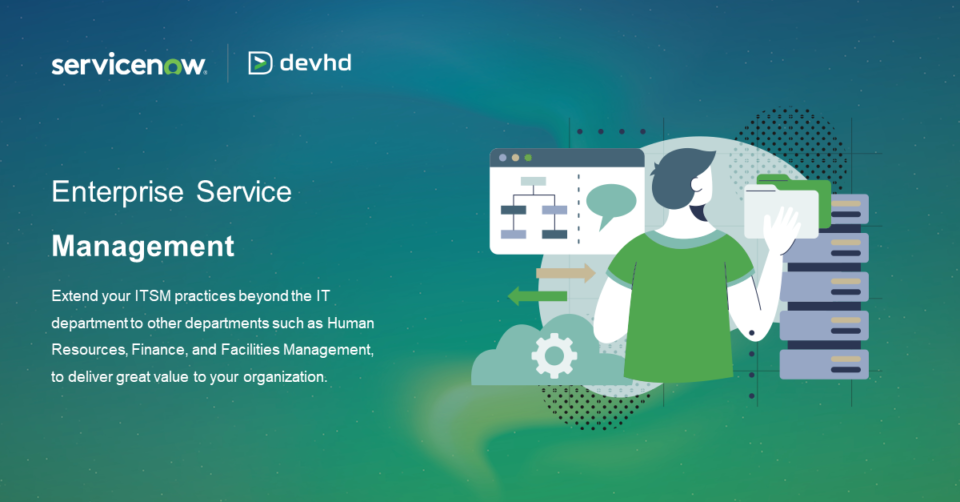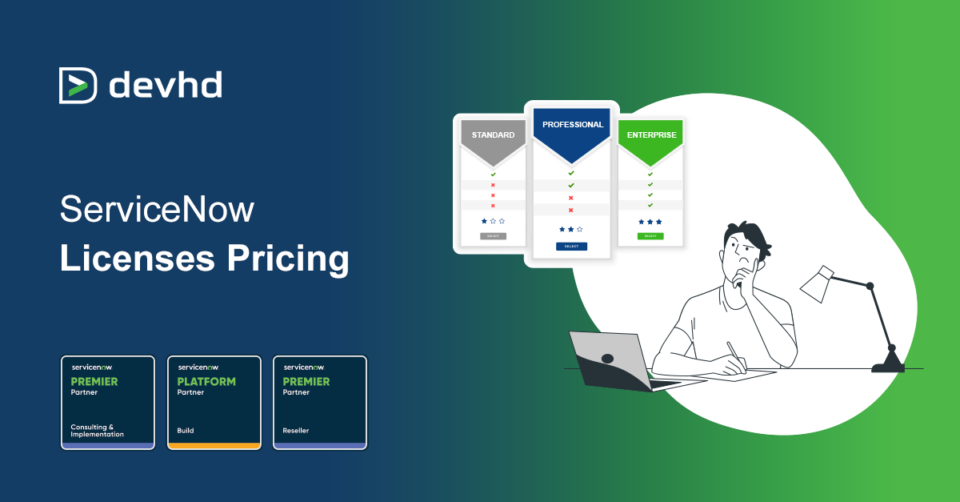ServiceNow is a game-changer for businesses seeking streamlined processes and enhanced productivity. In this article, we provide a general overview of the factors that influence ServiceNow pricing, the nuanced aspects of licensing, and how tailoring solutions to specific business needs is key to unlocking maximum value. This can help you better understand the investment required to transform your organization into a digitally optimized powerhouse.
What is ServiceNow?
ServiceNow, the intelligent platform for end-to-end digital transformation, enables companies in any industry to digitize processes across the organization by connecting them on a single, no-code low-code platform. It empowers people with optimized processes, connects silos for seamless experiences, and creates new value by enabling innovation.
With out-of-the-box digital workflow powered by AI and ML designed to address enterprise needs in its modernization and digital transformation, ServiceNow provides a one-stop shop for transforming into a single, unifying platform for digital business. It integrates disparate systems into a cohesive workspace, automates routine tasks, and streamlines processes, minimizing the time and effort required to deliver services.
With so many features to address various critical needs of the company, the question that is asked more than often is, how much does it cost?
How much does it cost?
The perception we often hear is that ServiceNow is expensive. But how can you tell? There are at least two reasons not to know that for sure:
- Confidential pricing: ServiceNow does not publicly disclose the pricing details of its licenses.
- Value-driven investment: Implementing this platform and its powerful capabilities results in clear and achievable cost savings while delivering a strong return on investment. Therefore, it’s difficult to say upfront whether it is going to cost that much in the long run.
While the exact cost of a ServiceNow implementation requires direct consultation with ServiceNow themselves or a ServiceNow Partner such as Devhd, understanding the nuanced aspects of ServiceNow pricing can provide valuable insights.
A different perspective: What is the cost associated with ServiceNow capabilities?
ServiceNow may not be the most affordable solution on the market, but it is the solution that delivers the highest value for every penny spent.
Although price is crucial in decision-making, we advise our customers to "invest in value" and to consider the total-cost-of-ownership over a few years. Why? Over time, the increased efficiency, better user experience, and automation from the ServiceNow platform not only make up for the initial expenses but lead to significant cost savings. While we know that this may not directly answer the cost question, we will do our best to explain things by highlighting key factors that impact ServiceNow pricing.
ServiceNow Pricing Factors

Your industry and geographical region
ServiceNow has solutions for industries across geographies, and each solution is unique in catering to the industry’s specific needs in specific geographies. Therefore, a generic solution may not fit the needs of your industry or geography, and accordingly, the licenses must be structured. For example, suppose you are a manufacturing business. In that case, your ServiceNow license may include software required for operations, or if you’re in a regulated industry such as finance or healthcare, you may be required to pay for specific features and functions that are unique to your industry, or you may be a government entity and require a highly secure FedRAMP certified highly secure environment.
Your company size and annual revenue
While traditionally believed that ServiceNow is only good for businesses with 500 or more employees, there's a growing trend where companies with around 200-300 employees are also expressing a high interest in ServiceNow products.
Your size is the first step in ServiceNow’s custom quote calculation, being a commercial company, public entity, or non-profit organization and it will also influence the total price.
It is important to understand that as the size of your organization increases, the complexity and number of tasks may also grow. This can result in additional license costs due to a higher number of users and software modules.
Business goals, product preference, and user needs
Tailoring to your business goals, product preferences, and user needs is at the core of ServiceNow licensing. It's not a one-size-fits-all solution; instead, it's crafted to align with the unique requirements of your organization, considering both current and future objectives. The evaluation takes into account your user base and internal processes, and, depending on the solution, it may extend to assessing external user needs. We at Devhd work with solutions architects and collaborate with ServiceNow and their account managers to develop a roadmap aligned with your unique business needs, ensuring the highest return on investment (ROI).
The cost of ServiceNow is influenced by the chosen product and licensing model. Whether you are opting for IT Service Management, Strategic Portfolio Management, IT Operations Management, Customer Service Management, Human Resource Service Delivery, etc., each product typically comes with multiple packages, each package introducing additional functionalities. While the general rule is that more functionality leads to higher costs, it's important to note that additional functionality can sometimes result in more discounts, offering a better overall price than purchasing individual products.
For instance, let’s take as an example the ServiceNow licensing model for the ITSM product. There are three packages:
- ITSM Standard
- ITSM Professional
- ITSM Enterprise

and some other ITSM Add-On Packages:
- Business Stakeholder v4: Geared towards those who perform all Requester functions and additionally have the authority to approve requests, view any record, and explore detailed reports.
- Employee Center Pro
- Workforce Optimization for ITSM Pro or ITSM Enterprise
- App Engine
- Process Mining for ITSM Pro or ITSM Enterprise
Another categorization is for license types, catering to different user roles:
- Requester: For individuals receiving services through the ServiceNow solution. This license allows them to create, edit, and view their own requests, and it's free of charge.
- Fulfiller User: Tailored for specialists delivering services to requesters. It grants full admin, developer, or usage rights within a purchased offering, empowering them to create, edit, or delete any record in the system.
- Unrestricted User: This simplified model imposes no restrictions on role assignment. The number of users designated as "active" is determined by the number of Unrestricted User licenses purchased.
Finally, GenerativeAI is a cutting-edge technology designed to mimic human creativity and generate content that feels remarkably lifelike. By learning from vast pools of existing data, it's capable of crafting realistic text, captivating images, and captivating media. In the latest Vancouver release, ServiceNow launched GenAI capabilities in the following products: ITSM, CSM/Industry, HRSD, and Creator Workflows. These capabilities are an add-on to the existing license types, and this means, that in our example for the ITSM product, there are two more license types:
- ITSM Professional Plus
- ITSM Enterprise Plus
Please note that ServiceNow offers diverse packages for its products. While we've provided details about ITSM in this article, we'll explore other ServiceNow products in future articles.
Although ServiceNow is a cloud-based platform, it does offer an on-prem solution in very special cases. However, the on-prem solution is more expensive as the business must maintain its infrastructure and be responsible for maintaining and upkeep the platform, including any updates, patches, or new releases.
Implementation Cost
Licensing is not the only cost associated with ServiceNow. Like any other cloud platform you buy, you must configure the ServiceNow platform to meet your specific business needs. The cost and implementation timelines depend on what license you purchased and how extensive your configuration or customization is. Collaborating with a ServiceNow Partner such as Devhd is crucial in this process. Devhd has extensive exposure to diverse environments, coupled with in-depth knowledge and certified personnel. Our expertise ensures adherence to ServiceNow's best practices and methodologies, contributing to a seamless implementation experience.
What value does ServiceNow bring to my organization in terms of cost?
At Devhd, we encourage you to first think about something else: is it worth putting your time and money into a ServiceNow solution? Based on our experience with ServiceNow in different-sized companies from various industries, we consistently see that ServiceNow's positive impacts make the effort worthwhile. When you tailor the implementation to tackle your organization's main issues, ServiceNow helps cut costs, streamline how your business works, and boost productivity in your chosen department.
Do you want to learn more about how ServiceNow can deliver value to your organization, what licenses you need to get started, and how much it may cost? Devhd’s experts can help you understand how to make the most out of ServiceNow and help you identify the right ServiceNow solution for your business needs.
So how much does it cost?
The short answer, it depends on your needs. You will have the license cost and the implementation cost. A general rule of thumb, opting for as much as possible the out-of-the box processes and leveraging embedded best practices can help control implementation costs.
But given the complex ServiceNow cost structure, if you need to know your exact pricing, the only way to do it is to contact our sales and technical teams. Find the package that works best for your business. Reach out to us at contact@dev-hd.com and we will arrange an initial discussion to help you in your ServiceNow Strategy planning.






















